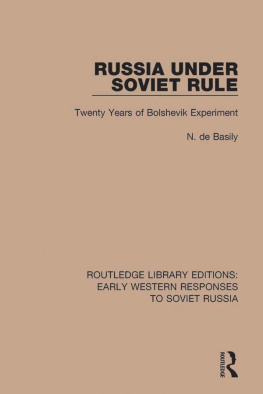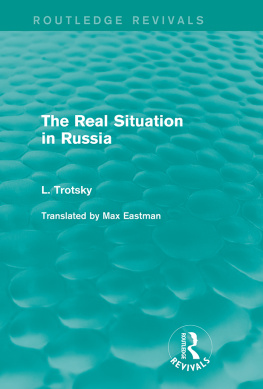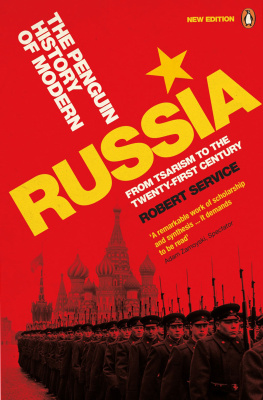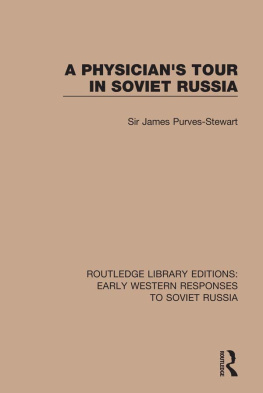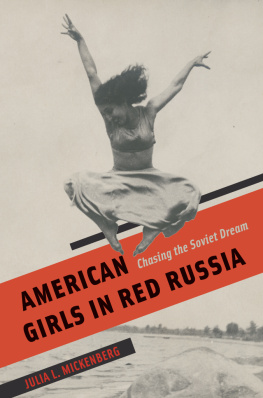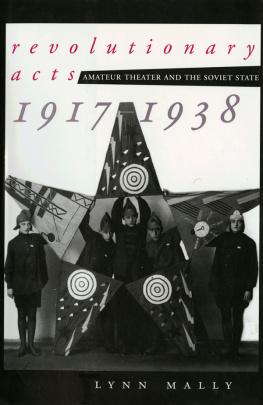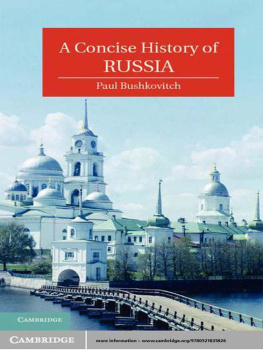First published in Great Britain in 1938 by George Allen & Unwin Ltd
This edition first published in 2018
by Routledge
2 Park Square, Milton Park, Abingdon, Oxon OX14 4RN
and by Routledge
711 Third Avenue, New York, NY 10017
Routledge is an imprint of the Taylor & Francis Group, an informa business
1938 N. de Basily
All rights reserved. No part of this book may be reprinted or reproduced or utilised in any form or by any electronic, mechanical, or other means, now known or hereafter invented, including photocopying and recording, or in any information storage or retrieval system, without permission in writing from the publishers.
Trademark notice: Product or corporate names may be trademarks or registered trademarks, and are used only for identification and explanation without intent to infringe.
British Library Cataloguing in Publication Data
A catalogue record for this book is available from the British Library
ISBN: 978-1-138-04993-2 (Set)
ISBN: 978-1-315-11072-1 (Set) (ebk)
ISBN: 978-1-138-08677-7 (Volume 1) (hbk)
ISBN: 978-1-315-11081-3 (Volume 1) (ebk)
Publishers Note
The publisher has gone to great lengths to ensure the quality of this reprint but points out that some imperfections in the original copies may be apparent.
Disclaimer
The publisher has made every effort to trace copyright holders and would welcome correspondence from those they have been unable to trace.
Due to modern production methods, it has not been possible to reproduce the fold-out maps within the book. Please visit www.routledge.com to view them.
RUSSIA UNDER SOVIET RULE
Twenty Years of Bolshevik Experiment
by
N. DE BASILY
London
GEORGE ALLEN & UNWIN LTD
FIRST PUBLISHED IN 1938
All rights reserved
TO
MY DEAR WIFE
Preface
CIRCUMSTANCES placed the author of the present volume in a position which enabled him to become thoroughly conversant with the working of the Government machinery in Russia, before the establishment of Bolshevism, and closely to observe the steady and social and economic progress of his country at that time.
From the beginning of this century to the very last moments of the old rgime, as well as under the Provisional Government of 1917, the writer was in immediate contact with the various political circles both on the Government side and adherent to the opposition. Animated by a profound love of his native land and sustained by his firm faith in its future destiny, he has endeavoured, in the sad years of exile, to penetrate and grasp the deep underlying significance of the ordeal through which Russia has been passing during the last twenty years; he has striven to discover the premonitory signs and the general trend of her inevitable regeneration. In the following pages he has sought to present without preconceived prejudicewithout hatred and without fearthe situation in Soviet Russia, as it developed since the Revolution of 1917, and the events which led up to it. Any thought of a return to past conditions must be dismissed; for this would be as impossible as it would be irrational. The revolutionary crisis through which Russia has passed and is still passing, however much suffering it may have brought, has irrevocably awakened the consciousness of great popularmostly peasantmasses scattered over this immense country. Only by the objective study of contemporary facts, pursued in the light of the historic past, may the direction be discerned in which the national life of Russia will find its way towards a better and freer future.
Conceived in this spirit, the work now offered to the English-speaking readersRussian and French editions having already appearedis based mainly on information drawn from Soviet sources, and more especially from official statistics issued by the U.S.S.R. authorities. The author is under no illusion as to the intrinsic value of these data and deems it his duty to caution his readers that they very often contain many inaccuracies due to the desire to present developments in the Soviet Union as being more favourable than is actually the case. Nevertheless, the mass of material published in the U.S.S.R. is so vast that, when analysed and computed, this informationimperfect as it is in many instancesclearly reveals the main outlines of the real situation. The conclusions which necessarily follow from these Sovietic data will often be found contradictory to the Bolshevik claims.
Developments in Soviet Russia are, to a certain extent, necessarily linked to the social and political evolution which the country was undergoing prior to the Revolution. On the contrary, the hurried and compulsory imposition of Socialismthe avowed primary aim of the Soviet Governmentconstitutes a complete rupture with the countrys past. The Bolshevik epoch is therefore fated to inevitable internal contradictions, and the Soviet Government is consequently doomed to venture constantly on new experiments. The Bolshevik rgime knows of a yesterday and of a possible to-morrow. Ceaseless changes leave it with no consciousness of any to-day.
The author has dealt at comparatively greater length with the economic problems of Soviet Russia than with the moral atmosphere there prevailing. Only a profound personal experience of daily life under the Soviet rgime, resulting from a long stay in the U.S.S.R., can furnish an adequate idea of the degree of moral oppression weighing on the Sovietic citizens. Here also was a complete rupture with the past. In spite of the resistance and mistakes of the old rgime, pre-revolutionary Russia was, even if with too great a delay, yet definitely moving towards liberty and democracy, especially since the introduction of a representative system in 1906, imperfect as it yet was.
* * *
To facilitate the reading of this work, the Gregorian Calendarnow commonly in use in all countrieshas been utilized for all dates, including the events prior to February 8, 1918, before which date the old Julian Calendar was in force in Russia. Consequently, referred to as the Revolutions of March and November, the months which were then in course in the rest of the world.
For the same reason the titles of the Russian publications cited in this book have generally been translated into English (for instance, ZaIndustrializatsiu into For Industrialization). Pravda (Truth) and Izvestia (News) have however been left in their native names.
In order to avoid confusion, the readers attention is directed to a point which is essential to the understanding of the internal structure of the U.S.S.R. The same men hold official posts in both the Soviet State institutions and in the Communist Party itself. The latter absolutely controls all the public affairs of the Union. No other party may legally exist in the country. Yet the State machinery of the Soviet Union has always been asserted to be distinct from the Communist organization. The Soviets, however much they may have been under the domination of the Communist Party, have always been organs of the State. The Executive Committees and the Central Executive Committeeemanations of the Sovietsshould not be confused with the Committees and the Central Committees, which are organs of the Communist Party. It should also be remembered that the

